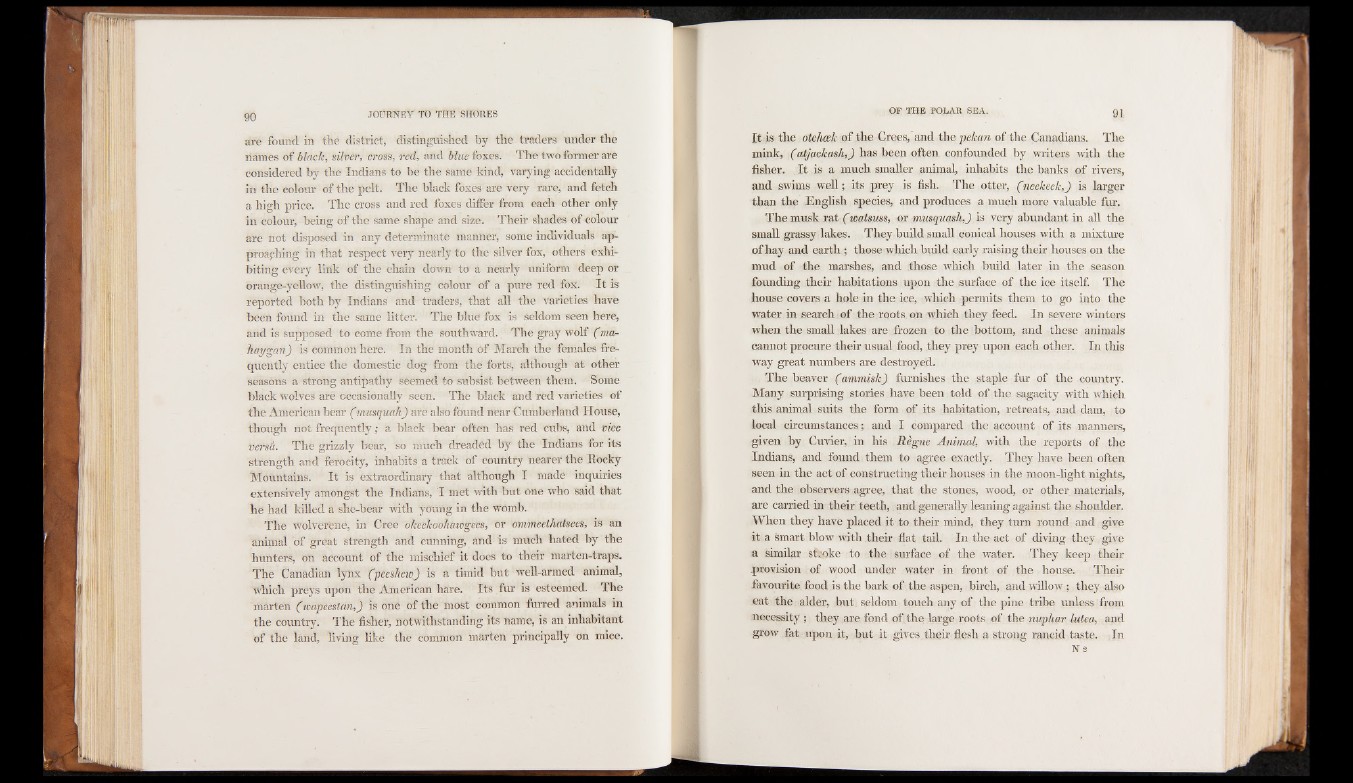
are found in the district, distinguished by the traders under the
names of black, silver, cross, red, and blue foxes. The two former are
considered by the Indians to be the same kind, varying accidentally
in the colour of the pelt. The black foxes are very rare, and fetch
a high price. The cross and red foxes differ from each other only
in colour, being of the same shape and size. Their shades of colour
are not disposed in any determinate manner, some individuals approaching
in that respect very nearly to the silver fox, others exhibiting
every link of the chain down to a nearly uniform deep or
orange-yellow, the distinguishing colour of a pure red fox. It is
reported both by Indians’ and traders, that all the varieties have
been found in the same Utter. The blue fox is Seldom seen here,
and is supposed to come from the southward. The gray wolf (ma-
haygan) is common here. In the month of March the females frequently
entice the domestic dog from the forts, although at other
seasons a strong antipathy seemed to subsist between them. Some
black wolves are occasionally seen. The black and red varieties of
the American bear (musquah) are also found near Cumberland House,
though not frequently; a black bear often has red cubs, and vice
vefsci. The grizzly bear, so much dreaded by the Indians for its
strength and ferocity, inhabits a track of country nearer the Eocky
Mountains. It is extraordinary that although I made inquiries
extensively amongst the Indians, I met with but one who said that
he had killed a she-bear with young in the Womb.
The wolverene, in Cree oJceelcooïiaiogees, or onimeethatsees, is an
animal of great strength and cunning, and is much hated by the
hunters, on account of the mischief it does to their marten-traps.
The Canadian lynx '(pceshem) is a timid but Well-armed animal,
Which preys upon the American hare. Its fur is esteemed. The
marten ( wapeestan,) is öné of the most common furred animals in
the country. The fisher, notwithstanding its name, is an inhabitant
of the land, living like the common marten principally on mice.
It is the otçhoek of the Créés, and the pekan of the Canadians. The
mink, ( atjackash,) has been often confounded by writers with the
fisher. It is a much smaller animal, inhabits the banks of rivers,
and swims well ; its prey is fish. The otter, ( nee keek,) is larger
than the English species, and produces a much more valuable fur.
The musk rat ( watsuss, or musquash,) ia very abundant in all the
small grassy lakes. They build small conical houses with a mixture
of hay and earth ; those which build early raising their houses on the
mud of the marshes, and those which build later in the season
founding their habitations upon the surface of the ice itself. The
house covers a hole in the ice, which permits them to go into the
water in search of the roots, on which they feed. In severe winters
when the small lakes are frozen to the bottom, and these animals
cannot procure their usual food, they prey upon each other. In this
way great numbers are destroyed.
The beaver ( arnmisk) furnishes the staple fur of the country.
Many surprising stories have been told of the sagacity with which
tins animal suits the form of its habitation, retreats, and dam, to
local circumstances ; and I compared the account of its manners,
given by Cuvier, in his Règne Animal, with the reports of the
Indians, and found them to agree exactly. They have been often
seen in the act of constructing their houses in the moon-fight nights,
and the observers agree, that the stones, wood, or other materials,
are carried in their teeth, and generally leaning against the shoulder.
When they have placed it to their mind, they turn round and give
it a smart blow with their flat tail. In the act of diving they give
a similar stroke to the surface of the water. They keep their
provision of wood under water in front of the house. Their
favourite food is the bark of the aspen, birch, and willow ; they also
eat the alder, but seldom touch any of the pine tribe unless from
necessity ; they are fond of the large roots of the nuphar lutea, and
grow fat upon it, but it gives, their flesh a strong rancid taste. In